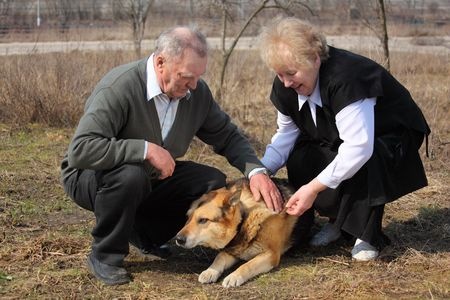 In recent decades, vets have seen a rise in the number of Canine Lymphoma cases that come through their offices. And dogs are being diagnosed with lymphoma at younger ages. But despite significant scientific research into Canine Lymphoma, nobody knows for sure exactly what causes it. However, based on research and experience, Canine Lymphoma experts have identified a number of factors that seem to be related to the cause of Canine Lymphoma, including the following:
In recent decades, vets have seen a rise in the number of Canine Lymphoma cases that come through their offices. And dogs are being diagnosed with lymphoma at younger ages. But despite significant scientific research into Canine Lymphoma, nobody knows for sure exactly what causes it. However, based on research and experience, Canine Lymphoma experts have identified a number of factors that seem to be related to the cause of Canine Lymphoma, including the following:
What We Know About Canine Lymphoma Causes…
Genetic Predisposition
Although Canine Lymphoma can develop in any breed of dog, certain breeds of dogs tend to be more susceptible to developing Canine Lymphoma. In particular, Canine Lymphoma most most commonly affects:
- Golden Retrievers (about 1 of every 8 Golden Retrievers gets Lymphoma)
- German Shepherds
- Beagles
- Boxers
- Rottweillers
- Labrador Retrievers
- Basset Hounds
- Scottish Terriers
- Airedale Terriers
- Bulldogs
- Poodles
- and Saint Bernards
For this reason, researchers assume that there must be some genetic component to the disease. However, genetics seems to represent just one component in the cause of Canine Lymphoma, and most experts believe that genetics alone is NOT the primary cause, but rather just one of many factors that combine to cause Canine Lymphoma in our pets. Several of those suspected factors are discussed in greater detail below.
Pesticides
In a study by Tufts University’s Cummings School of Veterinary Medicine, questionnaire data was used to evaluate the living situations of dogs diagnosed with cancer, and found that dogs that lived in homes that were professionally treated with garden pesticides were about 70% more likely to get Canine Lymphoma. Accordingly, the researchers suggested that the use of pesticides (some of which may have already been identified as carcinogenic) in gardens where dogs play may be a significant contributing cause of Canine Lymphoma. The danger of these garden pesticides makes sense in many ways, because unlike people, dogs often play, lay, and roll in these pesticide sprayed gardens – and then lick their coats which causes them to directly swallow some of these poisons. As such, to minimize the risk of Canine Lymphoma and other cancers, dog owners are cautioned not to spray poisonous chemicals in gardens and other areas where their dogs lay and play.

Electro Magnetic Fields
Another Canine Lymphoma study used questionnaire data to find a potential link between strong electro-magnetic electrical fields (e.g., power lines, etc.) and the development of Canine Lymphoma. Electro Magnetic fields are created by the energy of electricity running through power lines (in particular when those wires are exposed and running above the houses – as opposed to buried under ground). The strength of those electro-magnetic fields increase with the amount of energy running through the power lines, so larger, centralized power lines create more of an electro-magnetic disturbance. This study showed that, among the dog owners who filled out the questionnaire, dogs who lived in areas with exposed power lines were significantly more likely to develop Canine Lymphoma, which led the researchers to conclude that these electromagnetic fields represented one potential factor in the cause of Canine Lymphoma.
Smoking (Second Hand Smoke)
Using survey based research similar to those in the pesticide and electromagnetic field studies discussed above, several studies have linked second hand smoke from in house cigarette smokers to the cause of Canine Lymphoma in cats. And while the direct link between second hand smoke and Canine Lymphoma in dogs was less evident, many vets believe that second hand smoke can cause Canine Lymphoma in dogs as well.
Other Canine Lymphoma Causes
Other potential Canine Lymphoma Causes are believed to include:
- Poor Diet and Nutrition resulting in reduced immune system effectiveness
- “Pesticide-Based” Flea Care and related remedies fed to dogs or applied to their bodies
- And possible links to the Epstein Barr Virus
- Previous Article – Canine Lymphoma Types
- Next Article – Canine Lymphoma Symptoms
For more free Canine Lymphoma information, downloads and support - and
for help with your dog’s cancer care – visit our sister Charity website
"The Dog Cancer Tribe" at www.DogCancerTribe.com
Note: The information on this website is intended for research and informational purposes only. It is not to be used to diagnose or treat any disease, and should not be used as a substitute for proper veterinary consultation and care. Every dog and every cancer case is different, so if you fear that your dog has Canine Lymphoma, we encourage you to seek appropriate professional veterinary care as quickly as possible to determine the best course of action to treat your dog and his or her particular circumstances.
———————
| (c) 2021 - CanineLymphoma.com | Privacy Policy | Terms and Conditions | Sitemap |





